-
About
- About Listly
- Community & Support
- Howto
- Chrome Extension
- Bookmarklet
- WordPress Plugin
- Listly Premium
- Privacy
- Terms
- DMCA Copyright
- © 2010-2024 Boomy Labs


 Will Coley
Will Coley
Listly by Will Coley
This is a crowd-sourced English-language list from the New York Radio Club Google Group.
To view the most recent additions, use the "newest" filter (where it now says "Alpha" just below).
Please "up vote" (thumbs up) your favorites and/or suggest additions.

Acast, the world’s largest independent podcast company, today released the results of a new research study that shows podcasts are a highly trusted medium among US consumers. According to the study of US consumers, 64% of podcast listeners actively seek out podcasters and create time for their content -the most of any other tested media personality - making the time spent with podcasts highly engaging and intentional. These findings come at a time when trust in US media has hit an all time low, with half of Americans reported to believe that national news organizations deliberately mislead them, according to research from Gallup and the Knight Foundation. In this era of skepticism and misinformation, podcasters are emerging as the trustworthy figures of the media industry.
African-American podcasting’s ascent marks a potent articulation of Black identity and experience in media history, one reaching an unprecedented range of audiences, dialogs, and online communities. This study examines how content, production practices, and digital audiences for Black podcasting generate a metaphorical curriculum for blackness, a set of discursive cultural guides for listeners. Case studies representative of major genres and publishing sectors where Black podcasting flourished from 2010 to 2020 include humorous commentary on popular entertainment in The Read (2013-), independent media’s exploration of Black life in The Nod (2014–2020), and legacy media’s in-depth cultural criticism and analysis in Still Processing (2016-).
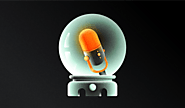
Podcast execs weren’t shy about how difficult of a year it was for their businesses, facing advertising slowdowns and the challenges associated with a maturing medium. Despite the ghost of 2023 following them into the new year, heads of podcasts at five companies were optimistic about 2024 when speaking with Digiday, sharing positive signals of continued audience growth, new advertising dollars coming into the medium and opportunities to expand shows into franchises. But they still face stiff competition as podcast networks fight to gain listeners and push into video to grow the reach of their content.
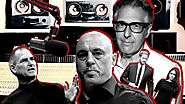
I lived through the boom-bust cycle (celebrity deals, canceled shows), and the term podcasting is feeling dated—“almost pejorative,” as Sam Sanders puts it. Still, Ira Glass thinks the industry should keep its eye on the craft and “leave the cool out of it.”

How technology transformed audio storytelling, made a few folks rich…and what happens now.

Shows are moving well beyond a simple MP3 file and an RSS feed. But will new data, targeting, discoverability, and social tools push podcasting in the direction of commercial radio? Part 4 of a five-part series on the business of on-demand audio.
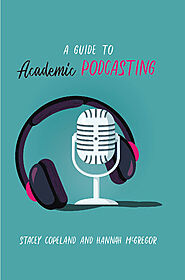
This guidebook is an open educational resource for current and future Amplify podcasters, and anyone interested in how to approach academic podcasting. What is academic podcasting? And why might you want to start an academic podcast in the first place? Academic podcasting is the communication of scholarly knowledge through the digital medium of podcasting. Podcasting can take on many forms, including interviews, audio documentary, fiction, or experimental sound forms. Podcasting can be a radical, open, and subversive way of creating publicly accessible and community engaged scholarship. We hope you’ll find this guidebook useful in the classroom, in the studio, and even at home, alongside your cup of morning coffee. Think of this as an invitation into the world of academic podcasting that you can return to time and time again throughout the development of your podcast. While this guidebook is far from exhaustive, we hope it will offer you a selection of best practices, templates, and resources that will benefit seasoned producers and podcast newcomers alike

Creators of audio content, as well as advertisers who want to reach consumers, are interested in whether audio is maintaining its place in people’s lives. Edison Research’s Share of Ear® study has been measuring the amount of time the U.S. population 13+ spends listening to audio daily since 2014. At the inception of Share of Ear in 2014, the U.S. population 13+ spent four hours and 17 minutes a day listening to all audio sources.
This article presents a case study study of a proposed analytical framework for dissecting and analysing intimacy in podcasts. The podcast medium is increasingly perceived as inherently intimate, but this discourse is still unprecise and has never been clearly outlined. It is furthermore essential to better define podcast intimacy because of its effective and widespread impact on podcasters and listeners. Over time, a self-reinforcing discourse and self-fulfilling prophecy of intimacy has built up around podcasts. Based on podcast literature (Berry, 2016; Euritt, 2023; Lindgren, 2021; Meserko, 2014; Spinelli and Dann, 2019; Swiatek, 2018) and podcast intimacy’s roots in, respectively, Web 2.0 and radio, four parameters for analysing podcast intimacy are outlined: Intimacy in listening, intimacy in what is said, intimacy in how it is said and intimacy in cross-media interactions – most significantly via social media. Each parameter contains several subcategories and questions for analysis which are collected in a schema. The schema is a tool for media researchers and students to identify how and why a podcast creates intimacy. It is also valuable for increasing the awareness of how podcasts work and impact the world. And it finally offers opportunities for podcast producers and publishers to learn more about how their podcast create intimacy and how they can attract listeners and followers through the creation of intimacy.

Once again, Ofcom has published its survey data for both its Podcast and Audio surveys. This year, Ofcom has published a report based on both sets of data, and it’s well worth a read through. But, as with previous releases, I’m going to dig into the 2024 podcast data in particular.

Podcasts have benefited from the unique intimacy of its ads. Can that strength survive the rise of programmatic and dynamic ad insertion? Part 2 of a five-part series on the business of on-demand audio.
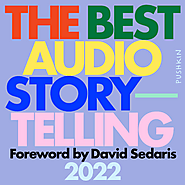
Julia Barton turned her public radio career to the development of story podcasts and now revives the Storyboard series 'Audio Danger.'

When Daphne Oram was commissioned to write about music, she was keen to avoid writing a conventional manual or how-to guide, preferring to use the opportunity to muse on the subjects of music, sound and electronics and the relationships between them. At the time, more musicians than ever were starting to get their hands on the tools of electronic music – equipment which formerly had been in the hands of large music studios, universities, and corporations. Oram’s approach to electronic sound and music was innovative and inspiring, encouraging anyone with an interest in music to think about the nature and capabilities of electronic sound and the new possibilities it offered. Her discussion wasn’t limited to the future of the orchestra, synthesizer, computer and home studio. She also ventured, with great spirit and wit, into other realms of science, technology, culture and thought.
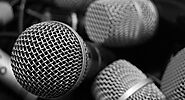
Through its early history, podcasting seemed separated from the waves of change happening in other sectors of digital media. But today, it's increasingly facing the same questions. Part 1 of a five-part series on the business of on-demand audio.
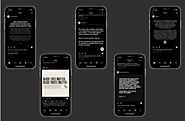
Dear Audio Industry Leaders, As an Indie podcaster, community leader and festival organiser, I am writing to address an issue that has become increasingly apparent and unacceptable: the persistent lack of support for marginalised creators in the audio industry. It is time for the audio industry to confront the glaring disparities and take meaningful action to address the systemic barriers holding back so many talented individuals...
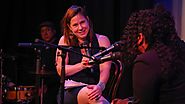
The audio industry is in turmoil. But, at an event for “Death, Sex & Money,” voices were still keeping people together. Listen to audio from the event here.
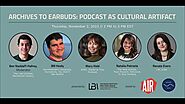
When an archival institution makes a podcast, it is not just highlighting historical artifacts from its collection, but it is also creating a new artifact. And in some cases the assemblage of existing audio recordings – snippets of decades-old broadcasts or excerpts from local oral histories – can transform a podcast itself into a chronicle of previously uncollected or inaccessible documentations that preserve and contextualize historical events and cultural moments.
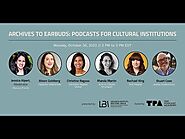
As cultural institutions consider new ways to engage diverse patrons and better serve a wide range of communities and populations, podcasts emerge as an exciting tool for just such engagement. But there's a steep learning curve for institutions when it comes to the cost of both producing podcasts and developing audiences for them. Our moderator and panelists share their insights and expertise on the challenges and opportunities of podcasting and how podcasts can serve the missions and programming needs of organizations in an increasingly competitive attention economy.
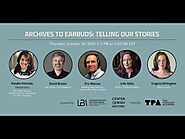
Podcasting can be a powerful tool for disseminating cultural and historical narratives otherwise ignored by mainstream media. The process of converting eclectic materials into an engaging narrative for listeners and balancing the distinct goals of historians and archival institutions with those of producers and publishers requires a deft understanding of the podcast medium.

In an era where the 'easy money' is gone, celebrity sluggers are beyond reach, and commercial outfits are pulling back, public radio orgs can win by leaning into data and ideas that helped them create the art form.
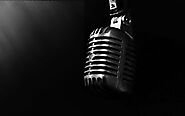
Getting revenue directly from listeners is not an immediate priority for most podcast companies. But when payment does arrive, will the money go mostly to producers, networks, or platforms? Part 3 of a five-part series on the business of on-demand audio.

This is a working list of podcast resources I’ve examined or hope to examine in the future. It’s incomplete, and I’m constantly building on it and adding more resources. It’s overwhelming, so think of it like a bibliography, or a list of potential articles for a lit review; something to file away for later, when you want to learn more about a specific topic. (I’ll be writing about those specific topics in the Podcast Love newsletter the coming weeks and months.)
Michel Chion’s landmark Audio-Vision has exerted significant influence on our understanding of sound-image relations since its original publication in 1994. Chion argues that sound film qualitatively produces a new form of perception. Sound in audiovisual media does not merely complement images. Instead, the two channels together engage audio-vision, a special mode of perception that transforms both seeing and hearing. We don’t see images and hear sounds separately—we audio-view a trans-sensory whole.
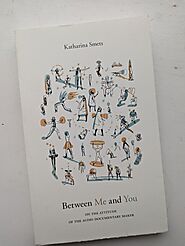
'In the beginning is the relation,' writes the philosopher Martin Buber, ‘as the category of being, as readiness, as a form that reaches out to be filled, as a model of the soul.’ In this essay I have brought together my own small collective of like-minded people, and through it I have learnt a great deal that has helped me to shift from a focus on the 'I' to an openness towards the 'You'. Order here: https://katharinasmets.bigcartel.com/

Bingeworthy helps us see narrative podcasts as their own thing. Not chatcasts. Not celeb gossip. Not short news segments. Narrative podcasts, or narrative audio, or narrative storytelling…whatever you want to call it…is its own thing. And my goal with Bingeworthy is to help celebrate that thing. That space. Those stories, the people who make them, the craft that becomes them and the underlying industry that makes that all happen.
